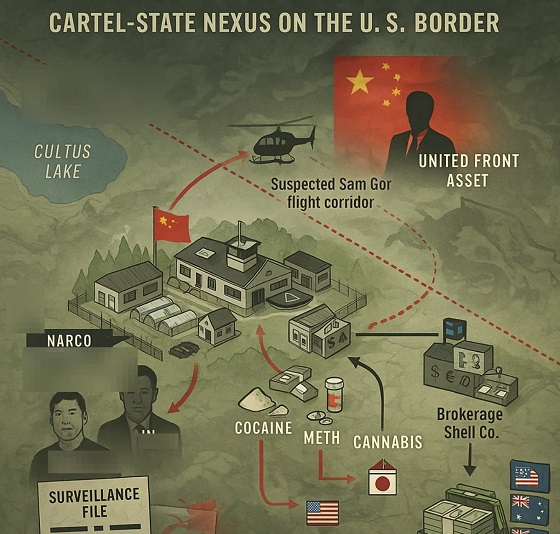COVID-19
Fauci’s Top Advisor May Have Illegally Evaded Records Requests, Experts Say

 From the Daily Caller News Foundation
From the Daily Caller News Foundation
“These revelations are startling,” Judicial Watch senior attorney Michael Bekesha told the DCNF. ” It appears as though Dr. Morens and maybe others at NIH sought to circumvent, if not violate, the law by using personal email accounts and deleting emails.”
A top advisor for former National Institute of Allergy and Infectious Diseases (NIAID) Director Anthony Fauci may have illegally taken actions to avoid records requests, experts told the Daily Caller News Foundation.
David Morens, a former senior adviser to Fauci, both deleted emails to evade Freedom of Information Act (FOIA) requests and told people multiple times to contact him at his personal email address to get around such requests, according to emails released by the House Oversight Committee on Wednesday. Morens, in his emails, also suggested that Fauci used his private email address to conduct government business.
“This is very illegal,” Matthew Hardin, a lawyer specializing in issues related to FOIA, told the DCNF.
“The Federal Records Act has strict requirements for preserving agency records in the agency’s custody for various reasons, including for purposes of facilitating the agency’s compliance with the Freedom of Information Act,” he continued. “This means that anybody conducting agency business through a ‘secret’ back channel or through Gmail is still creating a federal record, even if they are wrongfully concealing that record on a personal account instead of the government’s custody.”
In addition to using his private email address to communicate with others with the express purpose of getting around FOIA requests, Morens instructed others to reach Fauci at a private address for similar reasons.
In an April 2021 email to Peter Daszak, the president of EcoHealth Alliance, Morens said that there is “no worry about FOIAs” as he can “either send stuff to Tony [Fauci] on his private email, or hand it to him at work or at his house.”
“He is too smart to let his colleagues send him stuff that could cause trouble,” Morens continued.
“These revelations are startling,” Judicial Watch senior attorney Michael Bekesha told the DCNF. ” It appears as though Dr. Morens and maybe others at NIH sought to circumvent, if not violate, the law by using personal email accounts and deleting emails.”
Bekesha said Morens’ conduct could run afoul of the Federal Records Act, the Freedom of Information Act and the Privacy Act.
Daszak’s EcoHealth has received scrutiny for working with the Wuhan Institute of Virology, which some have posited was where the COVID-19 pandemic originated. The Federal Bureau of Investigation and the Department of Energy now both believe that COVID-19 likely emerged from a Chinese lab. EcoHealth was cut off from federal funding on May 15 in part due to issues with its monitoring of work done at the Wuhan Institute of Virology.
🔥 🔥 🔥
Chairman Comer GRILLS Dr. Fauci’s Senior Advisor, Dr. David Morens, who was caught deliberately obstructing @COVIDSelect’s investigation into the origins of COVID-19 to protect Dr. Fauci. pic.twitter.com/mWwAq3iDvd
— Oversight Committee (@GOPoversight) May 22, 2024
Beyond using personal emails to evade possible FOIA requests, Morens also said that he worked with his agency’s FOIA office to delete records of his communications.
“[I] learned from our foia [sic] lady here how to make emails disappear after I am foia’d [sic] but before the search starts, so [I] think we are all safe,” Morens wrote in a February 2021 email. “Plus [I] deleted most of those earlier after sending them to gmail [sic],” he continued.
Morens sent multiple emails between June 2020 and October 2021 suggesting that he’d deleted his government communications. “We are all smart enough to know to never have smoking guns, and if we did we wouldn’t put them in emails and if we found them we’d delete them,” he said in one email.
“The right of citizen access and the transparency of public records is constitutional and enshrined in Article I, Section 9, Clause 7 of the U.S. Constitution—within the powerful Appropriations clause,” Open The Books CEO Adam Andrzejewski told the DCNF. “Such an important and significant admission of the destruction of public records begs a non-partisan, criminal investigation,” he continued.
“The question now is how often are the feds working to hide or destroy information that belongs in the public record? Is it limited to the public health complex, or is it happening all over the government?”
If Morens deleted his emails to evade FOIA, Hardin says that could constitute “destroy[ing] government property.”
Michael Chamberlin, director of Protect the Public’s Trust, told the DCNF that “federal employees are obligated to preserve federal records” and that “destroying records for the express purpose of evading FOIA is a blatant and egregious violation of this obligation and should be treated as such.”
Morens also claimed to have a “‘secret’ back channel” to Fauci, a statement he walked back during congressional testimony on Wednesday by saying that he was only joking. Morens said during his testimony he did not recall sending information related to COVID-19 to Fauci’s personal email address, but that it’s possible he did so at some point.
The Department of Health and Human Services (HHS), which the NIAID operates within, declined to comment on the specifics of Morens’ emails.
“HHS doesn’t comment on personnel matters,” a spokesperson for the department said. “HHS is committed to the letter and spirit of the Freedom of Information Act and adherence to Federal records management requirements. It is HHS policy that all personnel conducting business for, and on behalf of, HHS refrain from using personal email accounts to conduct HHS business,” they continued.
Addictions
New Report – Five years on: Tracing the costs of lockdowns

In 2019, 67 percent of Canadians rated their mental health as “very good or excellent.” By 2023, that figure had dropped to just 54 percent.
A new report from the Justice Centre for Constitutional Freedoms examines the immediate and long-term negative impacts of Covid lockdowns, including physical, social, and economic harms. It also underscores the lack of transparent, evidence-based analysis by governments to justify these measures.
The report details how policies introduced with the stated goal of saving lives came at an extraordinary cost to Canadians’ mental and physical health, access to healthcare, economic security, and civil liberties.
One of the most concerning findings is the sharp decline in Canadians’ mental health. In 2019, 67 percent of Canadians rated their mental health as “very good or excellent.” By 2023, that figure had dropped to just 54 percent.
Meanwhile, the number of Canadians reporting “fair or poor” mental health nearly doubled—from 8 percent to 15 percent. This trend was seen across all age groups, but especially among young adults.
Indeed, despite facing minimal risk from Covid, young Canadians suffered some of the most serious consequences of lockdown measures. Non-Covid deaths among Canadians under age 45 rose by 22 percent, driven by factors such as disease, addiction, delayed treatment, and suicide. Physical activity among youth dropped significantly during this period, while time spent on screens—such as cell phones, computers, and tablets—increased sharply. Up to 70 percent of children and teens reported experiencing anxiety, depression, or other serious mental health issues.
A particularly alarming trend was the surge in opioid-related deaths. From 2020 to 2023, annual opioid overdose deaths increased by 108 percent. In 2023 alone, 8,606 Canadians died from opioid toxicity—more than double the pre-lockdown average. British Columbia, Alberta, and Ontario recorded the highest rates, with the vast majority of deaths involving fentanyl.
During Covid, thousands of medical check-ups, diagnoses, and treatments were delayed or cancelled, resulting in a serious and ongoing backlog in Canada’s healthcare system.
Wait times for medical treatments increased by 43 percent between 2019 and 2024, reaching a median of 30 weeks. MRI wait times rose by 55 percent. For certain cancers, including breast and prostate, surgery delays increased by as much as 34 percent. Since 2018, more than 74,000 Canadians have died while waiting for surgery or diagnostic care—over 15,000 of them in 2023–24 alone. The actual number is likely higher, due to poor provincial tracking and reporting.
The economic impact was equally severe. Lockdowns resulted in widespread job losses, particularly among low-wage workers, while the “laptop class” remained largely unscathed. While many public sector jobs expanded during this time, Canadians in hospitality, retail, and service sectors faced prolonged unemployment. The expansion of public spending and government debt contributed to rising inflation, driving up the cost of food, housing, and other essentials.
Crime rates also rose during the lockdown years. Homicides peaked in 2022 at 17 percent above trend, with 882 victims across Canada. Cybercrime nearly doubled, rising from 48,000 cases in 2019 to over 93,000 in 2023. Identity theft and fraud increased to 120 percent above trend in 2020, with similar levels in the following years. Particularly troubling was the rise in online child sexual exploitation, which reached 18,650 reported cases in 2023—a 173 percent increase from 2019.
Benjamin Klassen, Education Coordinator at the Justice Centre, says the findings demand accountability. “This report calls for governments to take responsibility for the damage done during this period and ensure that future public health policies uphold the Charter rights and freedoms of all Canadians.”
Mr. Klassen continues, “The Charter requires governments to ‘demonstrably’ justify any freedom-limiting policy. To date, no federal or provincial government in Canada has conducted the kind of comprehensive impact assessment required to justify the lockdowns.”
He concludes, “The evidence is clear: the harms of lockdowns outweighed their benefits. Canadians deserve an honest and transparent evaluation of lockdown harms, so that these mistakes are never repeated.”
COVID-19
Canada’s top doctor signed oath to withhold COVID info that could ‘embarrass’ Trudeau’s cabinet: records

From LifeSiteNews
Dr. Theresa Tam and dozens of managers with the Public Health Agency and Departments of Foreign Affairs, Health, Industry and National Defence signed an oath that prevented them from divulging information related to the COVID crisis
Dozens of Canada’s top health managers and the nation’s top doctor were required to sign a secret oath that prevented them from divulging information relating to the COVID crisis to not “embarrass” the federal government at the time.
Access to Information records show that Dr. Theresa Tam, Canada’s Chief Public Health Officer, and “quite a few” other COVID pandemic managers had to sign the pledge, as noted by Blacklock’s Reporter.
An internal staff email sent in 2020 from Alan Thom, vaccine supply manager with the Public Health Agency, showed he complained that so many managers had to take an oath of secrecy “at a certain point the Department of Public Works determined individual non-disclosure agreements were no longer needed for federal employees as we are all covered through our responsibilities as public servants.”
In total, 29 managers signed the oath with the Public Health Agency and Departments of Foreign Affairs, Health, Industry and National Defence.
The oath came right after the federal government, under former Prime Minister Justin Trudeau, signed a deal to buy mRNA COVID jabs with pharmaceutical companies.
The oath noted, in part, that “Unauthorized disclosure of any confidential information, including but not limited to disclosures or communications to supplier competitors or to the media may result in embarrassment, criticism or claims against Canada and may jeopardize Canada’s supplier relations and procurement processes.”
It continued, stating, “As an employee of the Government of Canada I acknowledge I have read and understood the Values And Ethics Code For The Public Sector,” the pledge stated. “I remain bound by my oath.”
Tam is a strong proponent of the COVID shots. At the peak of the COVID crisis in Canada, the Trudeau government signed about $8 billion in contracts with multiple companies, including, AstraZeneca, Johnson & Johnson, Medicago, Moderna, Novavax, Pfizer and Sanofi.
The first COVID jab to be approved for use in Canada was Pfizer’s BioNTech mRNA injection, which became available on December 9, 2020. Moderna’s mRNA jab followed a couple of weeks later. Of note is the launch of the jabs came after the Trudeau government gave vaccine makers a shield from liability regarding jab-related injuries.
MPs who asked questions to see the contacts were told they were not allowed to view them.
Canada’s Vaccine Injury Support Program (VISP) was launched in December 2020 after the government gave vaccine makers a shield from liability regarding COVID-19 jab-related injuries.
Recently, VISP injury payments are expected to go over budget, according to a Canadian Department of Health memo.
As reported by LifeSiteNews last week, a government-funded inhaled version of the COVID mRNA vaccines developed with abortion-tainted fetal cell lines is now entering Phase 2 clinical trials.
The federal government continues to purchase the COVID shots despite the fact its own data shows that most Canadians are flat-out refusing a COVID booster injection. It also comes as the government has had to increase spending on VISP, as reported by LifeSiteNews last week.
Canadians’ decision to refuse the shots also comes as a Statistic Canada report revealed that deaths from COVID-19 and “unspecified causes” rose after the release of the so-called “safe and effective” jabs.
LifeSiteNews has published an extensive amount of research on the dangers of the experimental COVID mRNA jabs that include heart damage and blood clots.
The mRNA shots have also been linked to a multitude of negative and often severe side effects in children, and all have connections to cell lines derived from aborted babies.
-

 Crime2 days ago
Crime2 days agoHow the CCP’s United Front Turned Canada’s Legal Cannabis Market into a Global Narcotics Brokerage Network
-

 Alberta2 days ago
Alberta2 days agoAlberta Precipitation Update
-

 Business2 days ago
Business2 days agoReal Challenges Await Carney
-

 Business19 hours ago
Business19 hours agoFrom ‘Elbows Up’ To ‘Thumbs Up’
-

 Daily Caller1 day ago
Daily Caller1 day agoStates Attempting To Hijack National Energy Policy
-

 Business16 hours ago
Business16 hours agoLEGO to invest $366 million on major U.S. expansion
-

 espionage1 day ago
espionage1 day agoGOP rep moves to shred PATRIOT Act, dismantle Deep State spy powers
-

 Addictions1 day ago
Addictions1 day agoNew Report – Five years on: Tracing the costs of lockdowns





